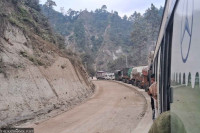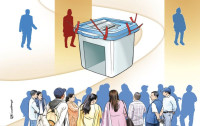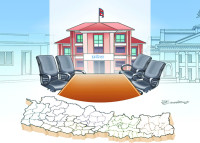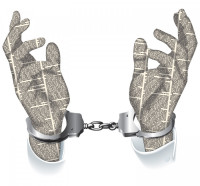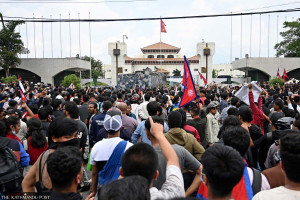Opinion
An alternative to violence
On the morning of June 4, I awoke to a call from Do-Tarap, a small village in Upper Dolpa. The call said that on June 3, police had suddenly fired several rounds of rubber bullets.
Tashi Tewa Dolpo
Structural violence
According to Phurwa Dhondup, one of the victims, the police later barged
into all nearby houses and began destroying the wooden gates to the houses while shouting, ‘Bhote haru lai ek ek gari mar dinchu.’ (Will kill those bhotes one by one).
By June 5, 12 people (Nine from Do-Tarap and three from Chharka) were released from custody after the police succeeded in getting the family of Tsering Phurwa to accept his death as ‘natural’. One local witness described Tsering Phurwa with his eye out of its socket and blood oozing from his ear, crying out and holding onto his stomach.
The excessive structural violence employed and sustained by the state via the police upon the local people is evident in the above incident. This level of violence by the state has further pushed an already remote community further into isolation. In this piece, I will argue that the legitimisation of the individualised state’s violence threatens the communal or collective knowledge.
State, violence and order
For any state to orchestrate violence has never been a new phenomenon to institutionalise order. Every modern state, moreover, has promoted violence to legitimsze its authority and give credence to punishment. In this case, the state’s violence was inflicted upon an indigenous population, to the benefit of the majority. But this too is not anything new.
This form of violence has its roots in the era of ‘unification’. Though the forms of violence might be different, the locals were subjected to structural violence under the burden of compulsive taxation and other forms of payment. Mahesh Chandra Regmi, writing about the kings of the Gorkhali Empire 1768-1814, argues that locals were always treated as peasants and were subjected to excessive taxation since the reign of Rana Bahadur Shah. Dolpa was not free of that either, subsequently under the regime of Jumla, Mustang, the Shahs and the Ranas.
Structural violence only took another form with the institutionalisation of the Muluki Ain in 1854. This ‘Hindu’ notion of the state affected the cultural livelihood of the people, especially their beef-eating practices. Locals faced much hardship in acquiring citizenship cards as they were often seen to be not citizens.
Individuals and collectives
There has always been the debate between the philosophical ideas of the individual and the communal. Whether it is the idea of liberty, justice, equality, democracy, rights, citizenship, power and the state, the overall debate revolves around these two concepts. In general, the individual proposes universality and majority whereas the communal is against the ‘tyranny of the majority’ and hence, emphasises collectivity, difference and inclusion of all representative communities for any political practices. The debate encounters a problem when it reaches practical levels. The state, or the individual in this case, always tries to maintain ‘order’ and promotes violence and hence, challenges local norms and cultural practices of communal or subaltern communities.
In this theoretical debate and the practical yet violent phenomena regarding the individual and the communal, one should always look forward to prioritising the goods of the communal. Their indigenous knowledge, forms of governance and security systems should be protected by the state. Their knowledge should not be treated as ‘barbaric,’ ‘poor,’ and ‘uncivilised’ by anyone. Jared Diamond, in his book, ‘The World until Yesterday,’ successfully illustrates why traditional societies are still important for the world. These societies can disseminate solutions to universal human problems such as child rearing, elder care, dispute resolution, risk and physical fitness. Conflicts are resolved instantly through the acknowledgment of each other feelings and loss, even continuing to reestablish daily dealings and relationships.
Therefore, excessive violence should never be implemented by the state upon the local citizens. The locals will take time but will settle issues among themselves as they have to face each other daily. Their social relationship becomes especially important in Dolpo, far from the chaos of Kathmandu.
Tewa Dolpo is currently working as a Research Assistant at the Nepa School of Social Sciences




 16.57°C Kathmandu
16.57°C Kathmandu
